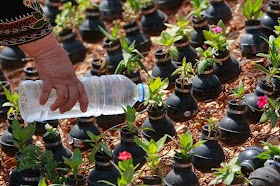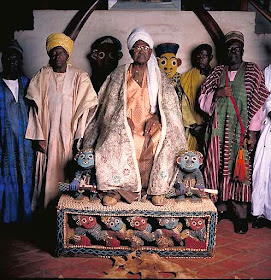 |
| They burn money, destroy expensive clothes and pour bottles of alcohol on the ground. The 'Izikhothane' live well beyond their means, spending more money than they and their parents can afford in order to be cool. This South African craze is as intriguing as it is shocking. |
Several townships in Johannesburg, mainly Soweto in the south and Diepsloot in the north, claim to be the birthplace of 'Izikhothane' youth culture, also called 'Skhotane' and 'Ukukhothana' in other neighbourhoods. The term – Zulu for “to lick” – apparently has several origins. Some say it refers to the action of licking the fingers to peel through bundles of money to spend on clothes, shoes and alcoholic spirits. Others say it refers to being drenched in 'Ultramel', a local custard considered a luxurious desert in black townships, and of licking hands and clothing.
“They like to show that money is no object,” says Tshepo Mokone, a 25-year-old Sowetan who has observed various groups at close hand. “Destroying symbols of value gives them recognition and status, and that is what they crave – much more than money. The bigger the display of abundance and your ability to destroy it, the bigger your ‘swag’, and that’s what matters to them most.”
One spring evening in Soweto, Phumi Ntshangase, 20, was in full swagger mode. Sporting an embroidered patterned shirt, designer sunglasses, diamond earring, shiny pink shoes and a gold tooth, he was enjoying a “roll” with other members of his group, known as the FBI or Full Blooded Italians because of their penchant for Italian designer labels.
Such scenes of decadence have outraged some older South Africans. The mayor of Ekurhuleni, an area outside Johannesburg, recently denounced the movement as “abhorrent”.
“Democracy has gone to their heads,” says Mokone, who shows tourists around the landmarks of Soweto’s apartheid-era struggle. “They think it means you have the right to do anything you want. Many of these kids are at high school, and this movement just shows contempt for the sacrifices their parents and grandparents made.”
“We’re the Italians,” Ntshangase said, brandishing a tattoo on his left arm where the letters FBI were arranged like a designer label; other groups have names such as the Vintages, after expensive alcohol, and the Overspenders. Competition between them is fierce but not violent. At one recent altercation, the biggest insult seemed to be, “Your T-shirt is faded. Go away with your faded T-shirt – you should not be here.”
It is often parents who finance the izikhothane lifestyle. As Ntshangase swigged beer with some of his friends, his mother passed by. She came over and pressed a new smartphone into his hand. Showing off her own gold tooth, she said proudly, “He loves this lifestyle. He feels he is someone, and that pleases me. We – our generation – never had that feeling. It is good to see him happy.”
Kunene recently denounced the practice of burning clothes and tearing up banknotes, but defended the izikhothanes for having the confidence to dress and behave like no one “expects poor blacks” to. He pointed out that these young people do not fight in gangs or take drugs, and encouraged them to aim high, getting an education to go with their flashy lifestyle.
























































